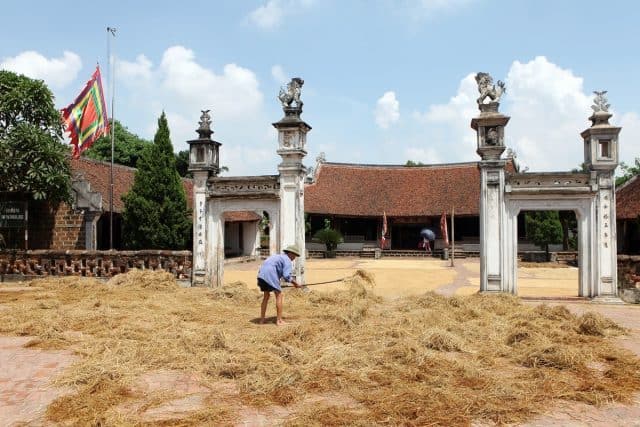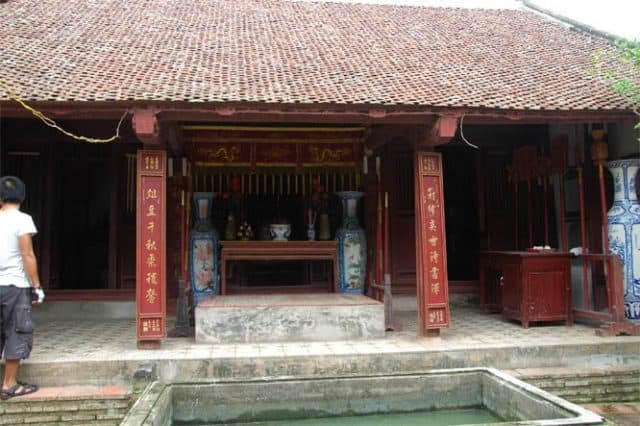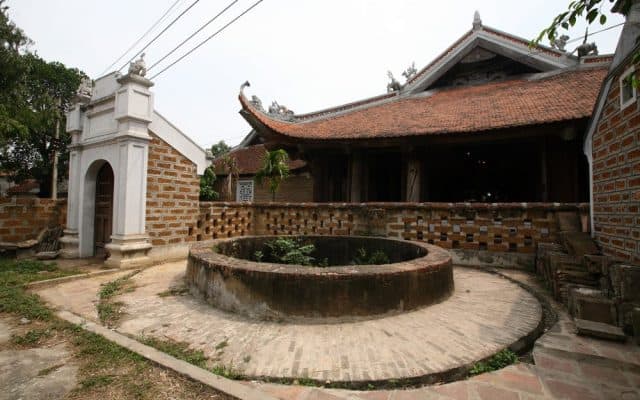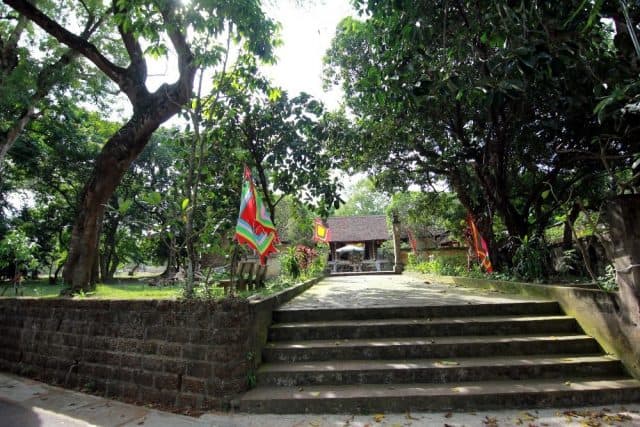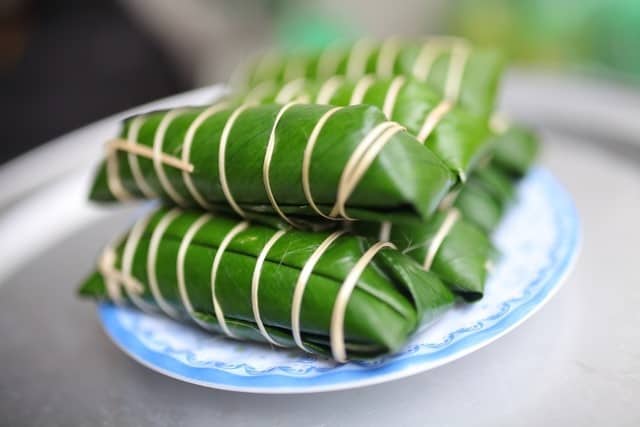44km from Hanoi, Duong Lam ancient village is the perfect choice if you are looking for a peaceful countryside to rest after the chaos of life. This place also preserves many old architectural houses with brick roads, laterite walls and cultural features of the northern countryside. Let’s “pocket” right now, the latest Duong Lam ancient village travel experience below!
About Duong Lam ancient village
Where is Duong Lam ancient village?
Duong Lam ancient village is located in Son Tay district, Hanoi, only 44km from the city center. Duong Lam is the hometown of Ngo Quyen and Phung Hung, so it is called “the land of two kings”. To this day, Duong Lam village still retains the basic features of a village in the North with village gates, banyan trees, water wharf, communal yard, … with 956 traditional houses. In 2006, Duong Lam became the first ancient village in our country to be awarded the National Historical and Cultural Relic by the State.
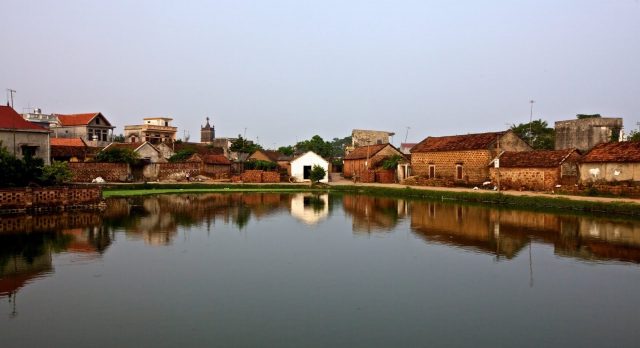
The right time to visit Duong Lam ancient village
You can go to Duong Lam ancient village at any time of the year. However, the festival season and the ripe rice season are the most suitable times for a trip.
1. Festive season
Duong Lam village festival season takes place in the first lunar month every year. The traditional festival of Mong Phu village takes place from the 4th to the 10th, which is considered the most sacred festival of the year. The ceremony of Thanh Hoang village is held at the oldest communal house with palanquin processions, pig offerings, chicken offerings, etc. After that, people in the village will participate in folk games such as human chess, chess, fighting. chickens, blindfolded to catch ducks, etc., creating a joyful and bustling festive atmosphere.
6 days later, the festival of Dong Sang village was held, praying for national peace and good harvest with many attractive activities such as lion dance, water procession, and sacrifices. The water procession starts from the village communal house to the banks of the Red River with dragons, unicorns, horses, flags, etc., lasting for nearly a day. Coming to Duong Lam during this time, you will enjoy the bustling festival atmosphere and enjoy the special dishes that are only available in the festival.
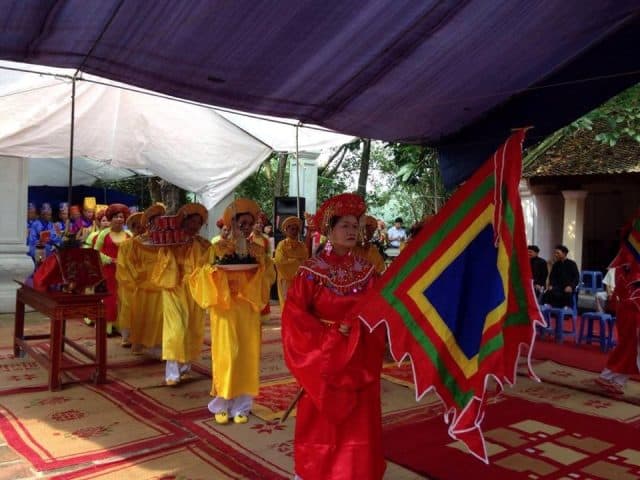
2. Ripe rice season
Every year in May and June – when the rice fields are at full maturity, Duong Lam on the day of the season is also the time when tourists flock here the most. The roads in Duong Lam are covered with rice and dry straw, creating a peaceful, peaceful village scene that is rarely found anywhere else.
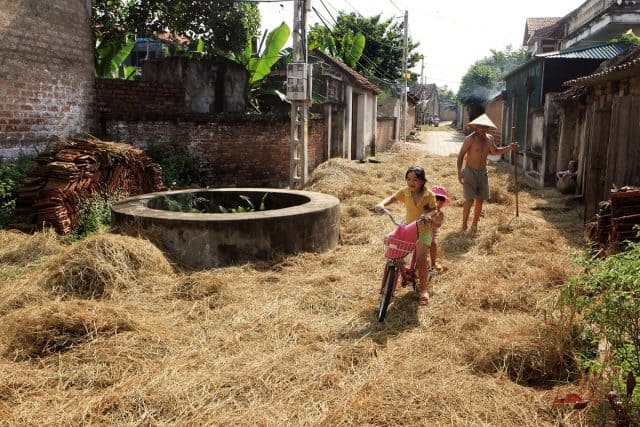
Seasonal day in Duong Lam (Photo: Collected)
Move to Duong Lam ancient village
Located on the outskirts of Hanoi, moving to Duong Lam ancient village is also quite easy. You can get to Duong Lam by the following ways:
Go to by bus
There are 3 bus routes moving from Hanoi to Duong Lam ancient village:
- Route 71 from My Dinh bus station to Son Tay bus station, ticket price is 20,000 VND
- Route 73 from My Dinh bus station to Thay pagoda, ticket price is 10,000 VND
- Route 89 from Yen Nghia bus station to Son Tay bus station, fare 9000 VND
From Son Tay bus station, you can take a motorbike taxi or taxi to Duong Lam ancient village.
Going by private vehicle
From Hanoi, it is quite easy to go by motorbike or car to Duong Lam. There are 2 routes for your reference:
- Go in the direction of Thang Long Boulevard, turn right at Hoa Lac junction, follow road 21 through Son Loc to the intersection with road 32, you will see a signpost to enter Duong Lam
- Take road 32 to Son Tay town, at the intersection with road 21 there will be a turn to the village on the left hand side
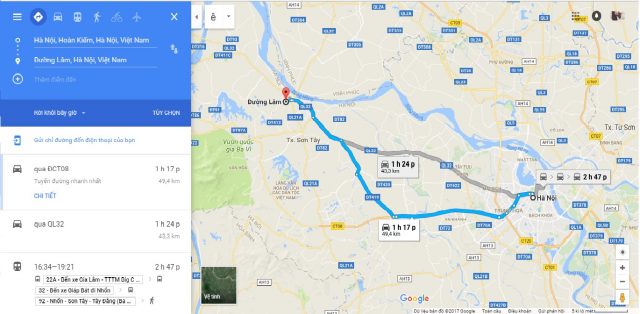
Going by bus
You can also choose the bus route My Dinh – Phu Tho to get to Duong Lam with a travel time of about 1 hour and 15 minutes.
Staying and resting in Duong Lam ancient village
Due to its location near Hanoi, visitors often come to Duong Lam and return within the same day. However, if you are far from Duong Lam or want to stay to enjoy the peaceful atmosphere of the countryside, hotels and motels in Son Tay will be the right choice for you.
Duong Lam ancient village tour
Mong Phu village gate
This is the only ancient gate remaining to this day in Duong Lam. The village gate was built in the Later Le Dynasty, has a different architecture compared to the traditional village gate, like a house with two sloping roofs, with pillars supporting the roof and top of the roof in the style of “upper family Xiamen” (above is house, below is the gate). Mong Phu gate together with banyan tree, wharf, lotus pond create a typical scene of the old village of the North.
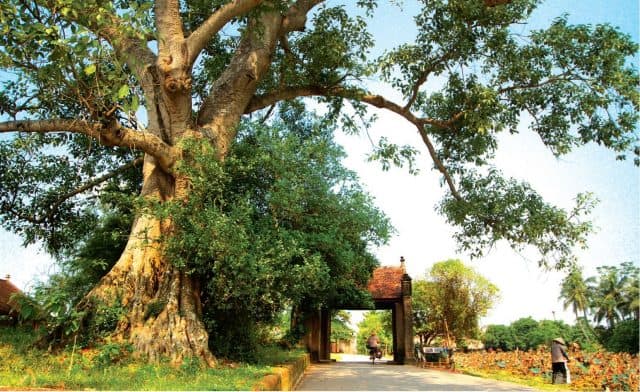
The image of the gate of Mong Phu village (Photo: Collected)
Mong Phu village communal house
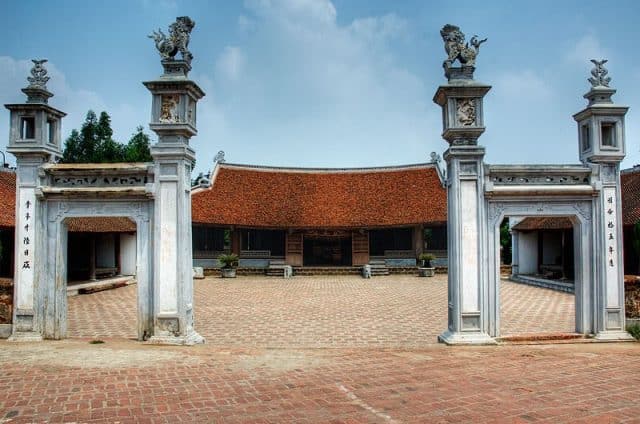
The image of the communal house of Mong Phu village (Photo: Collected)
Mong Phu communal house was built nearly 380 years ago on a central land of the village, about 1800m2. The design of the communal house is boldly Vietnamese – Muong architecture, simulating the architecture of a house on stilts with wooden floors separated from the ground. The communal house consists of two palaces and a harem. Dai Bai house is built by 48 wooden columns, above each column there are carved many dragon and phoenix patterns.
Inside the communal house, there are many parallel sentences hanging. The most prominent ones are the “old dragon trainer” painting, which means the old dragon teaches children, and the “brave and thought-provoking” painting by King Thanh Thai. It also preserves many unique architectural and cultural values, attracting tourists.
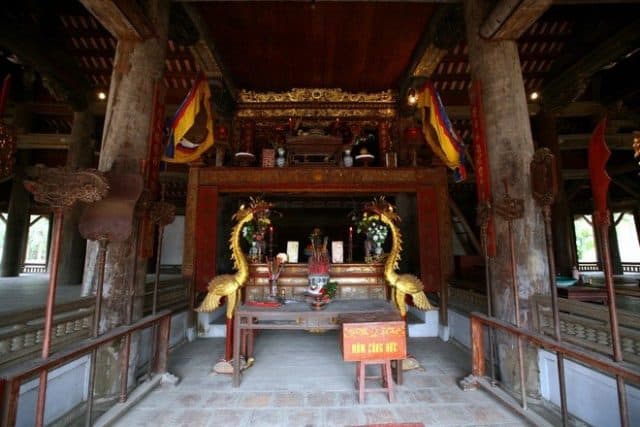
Inside Mong Phu communal house (Photo: Collectibles)
Church of Detective Giang Van Minh
Built during the reign of King Tu Duc to worship and remember the merits of Detective Hoa Giang Van Minh. The church faces the South, has the architecture in the shape of the word “second”. Today, the church has become an attractive tourist attraction for tourists interested in learning about history and culture, as well as a place to educate patriotic traditions for the younger generation.
Old houses
Duong Lam ancient village has 956 old houses, many of which were built in the years 1649, 1703, 1850, etc. These old houses are all made from traditional materials: laterite, oval wood, etc. bamboo, terracotta bricks, tiles, etc. with 5 or 7 compartments architecture.

The gate of an old house in Duong Lam (Photo: Collectibles)
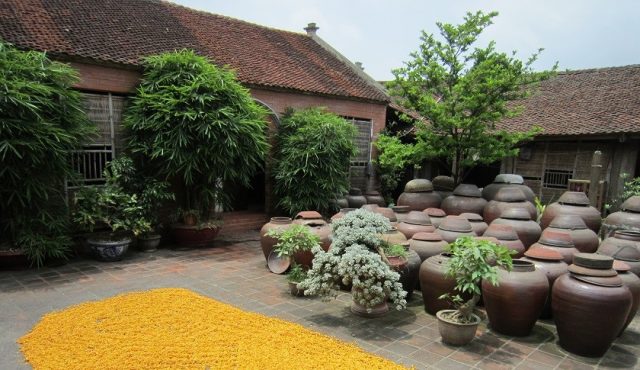
These houses are built with 5- or 7-room architecture (Photo: Collectibles)
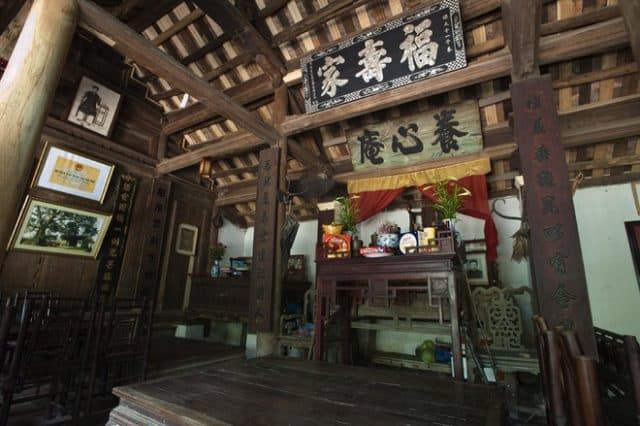
Inside an old house in Duong Lam (Photo: Collectibles)
Duong Lam Ancient Well
In the past, the village well was the place where people got water for daily life. The ancient wells here are located in a high, airy place, near the communal house, pagoda or the center of the hamlet.
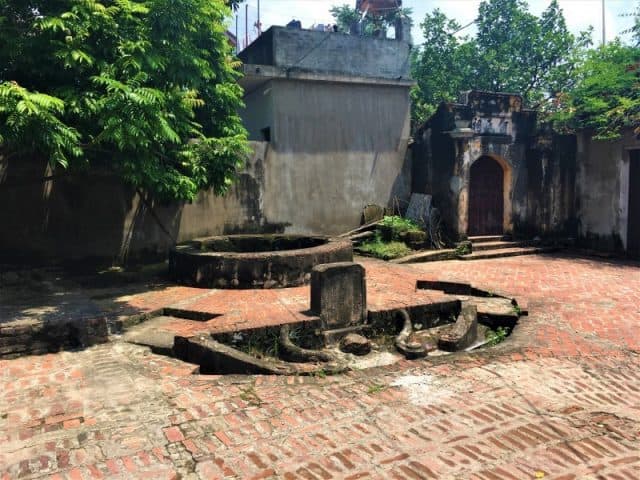
Duong Lam ancient well (Photo: Collected)
Temple of Phung Hung
Phung Hung temple was established in many places, but the temple in Duong Lam village is the largest temple with unique architecture including Ta – Huu Mac, Dai Bai and Hau Cung.
Ngo Quyen Mausoleum and Temple
About 500m from Phung Hung temple is Ngo Quyen mausoleum. Ngo Quyen temple and mausoleum complex was built on Cam hill, in front is a large rice field and Lom valley flowing into Tich river. The temple consists of a place of worship, a great cult, a harem, and a stele house. At the bottom, about 100m from the temple, is King Ngo’s mausoleum built in the shape of 4 roofs on a high pedestal, surrounded by walls.
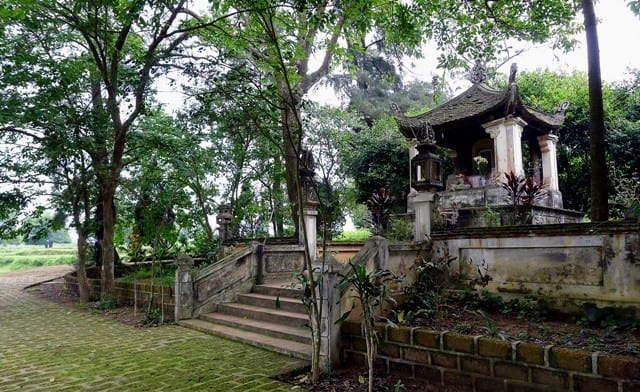
Tomb of Ngo Quyen (Photo: Collected)
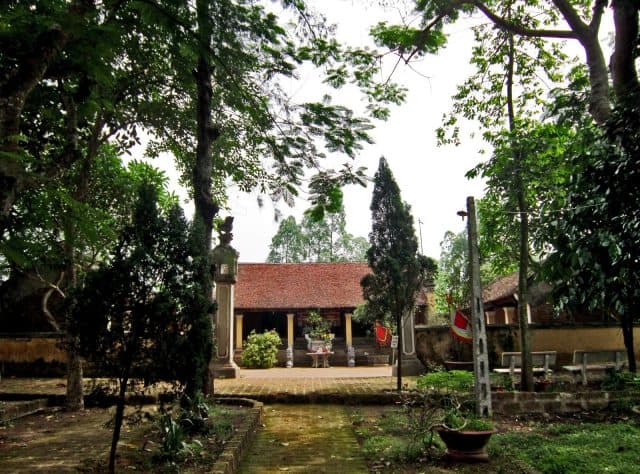
Ngo Quyen Temple (Photo: Collectibles)
Delicious dishes in Duong Lam
Cane chicken
In the past, this was a precious dish, only used to advance the king or used in village festivals. Cane chicken has small legs, yellow feathers, white when boiled, yellow and crispy skin. Come to Duong Lam, you should try to enjoy this specialty dish.
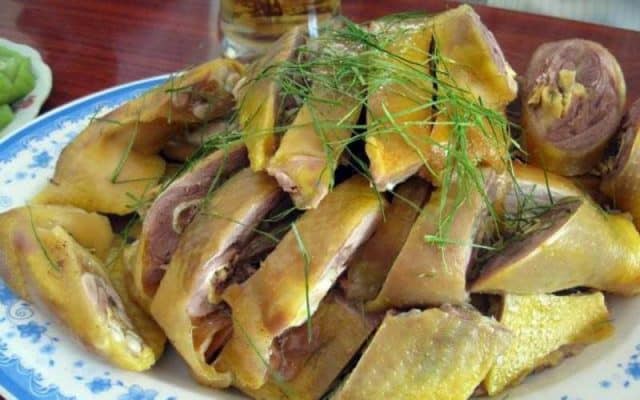
Buds
Duong Lam rice cakes have many differences compared to cakes of other regions. Here, the cake is wrapped with long, elongated dong leaves, and the filling is spread evenly along the leaf spine.
Candies, peanuts, sesame candy
This is a traditional candy made with very rustic ingredients such as peanuts, sugar, malt, sesame, and rice flour. When eating candy, the sweet aroma and fleshy taste of sesame and peanuts.
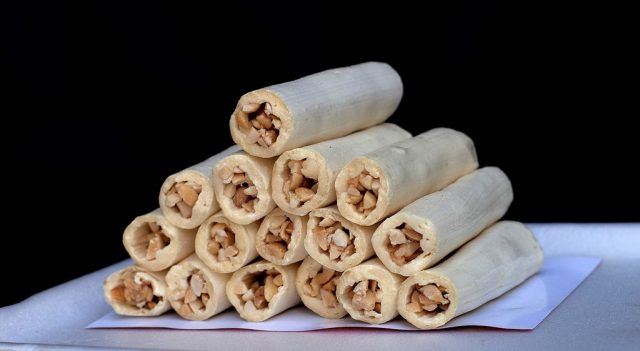
Duong Lam sausage specialties (Photo: Collectibles)
Hopefully with the sharing of the latest Duong Lam ancient village travel guide above, you will have a happy and convenient trip!
Source: Collected internet.
